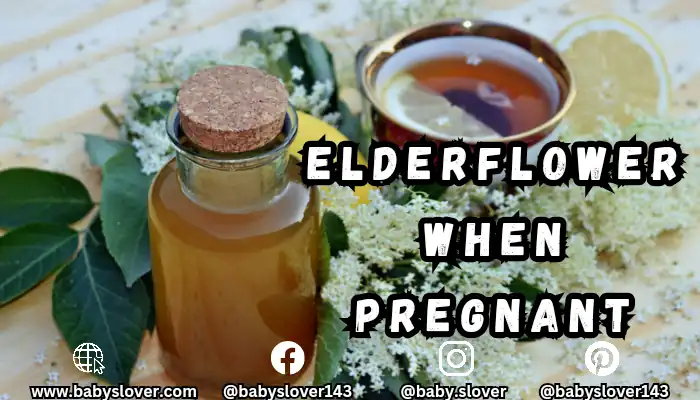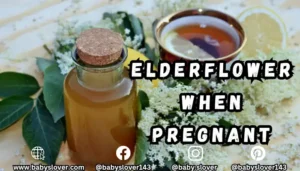Pregnancy comes with many food cravings and aversions as your body goes through incredible changes. While you may have heard great things about the floral flavor of elderflower, you likely have questions about whether it is safe to consume elderflower in pregnancy.
Elderflower is a popular ingredient in cordials, teas, wines, and other products in places like England. Understanding the potential uses, side effects, types of elderflower drinks, and safety precautions can help ensure you make the best choices during your pregnancy.
Here, you will discover everything you need to know about using elderflower during pregnancy, including its benefits, risks, and side effects. You’ll learn how elderflower can support your health, what precautions to take, and how to safely satisfy your cravings.
We’ll also cover common questions about consuming elderflower tea, cordials, and more during pregnancy, empowering you to make informed decisions for both you and your baby.”

Contents
What is elderflower?
Elderflower comes from the elder tree, scientifically known as Sambucus nigra. The white flower buds are used to make syrups, cordials, teas, and other products that have a light, sweet, floral flavor. Elderflower is popular in beverages in places like England, where it’s made into soft drinks, teas, wines, and cordials.
The raw elderflower buds, leaves, and bark contain cyanide and are toxic. However, commercial elderflower products made from the cooked flower buds are safe. Elderflower has some medicinal properties and has traditionally been used to boost immunity and treat colds, flu, and sinus congestion.
Types of Elderflower
There are a few main types of elderflower products:
- Tea – Elderflower tea is made from the dried flower buds and is often combined with flavors like lemon and ginger. Look for caffeine-free blends.
- Cordial – Elderflower cordial is a concentrated syrup made with elderflower, lemon, sugar, and citric acid. It’s diluted with water to make a floral-flavored drink.
- Lemonade – Simple elderflower lemonade mixes the floral cordial with water, lemon juice, and sweetener. Some brands contain champagne or alcohol.
- Wine – Fermented elderflower wine uses the blossoms, yeast, and sugar to produce an alcoholic brew. This should be avoided during pregnancy.
Uses of Elderflower
Elderflower is used in the following ways:
- As a flavoring in drinks like cordial, tea, and lemonade
- As an ingredient in some foods like syrups, jams, and desserts
- Traditionally used as a herbal remedy for colds, flu, and respiratory issues
- To make alcoholic wines and champagnes
Can you drink elderflower in pregnant
Drinking elderflower is generally considered safe when pregnant, but there are some important caveats.
The key is to consume elderflower beverages like tea, cordials, and lemonade in moderation. The concentration of elderflower is low in these commercial drinks. Avoid overconsumption.
It’s best to avoid taking elderflower supplements or drinking alcoholic elderflower wines when pregnant. Supplements are not regulated and could contain harmful ingredients. Alcohol should be completely avoided during pregnancy as it can harm the developing baby.
Some precautions to take with drinking elderflower include:
- Check the ingredients labels of teas and drinks for unsafe herbs
- Limit caffeine if drinking elderflower tea
- Be mindful of sugar if you have gestational diabetes
- Always avoid homemade, fermented, or alcoholic elderflower drinks
In moderation, commercial elderflower cordials, lemonades, and teas that are diluted with water are considered pregnancy-safe for most healthy women. But be sure to consult your doctor with any concerns.
Benefits of elderflower during pregnancy
There are a few potential benefits of consuming elderflower in moderation during pregnancy:
- Flavor and Variety – Elderflower products add a pleasant floral flavor to drinks and foods. This can provide variety and help satisfy cravings during pregnancy.
- Immune Support – Some research suggests elderflower has antimicrobial and anti-inflammatory properties which may help support immunity. Boosting immunity is important during pregnancy.
- Vitamin C – Elderflower contains a small amount of vitamin C, a crucial vitamin during pregnancy that helps with fetal development and nutrient absorption.
- Gestational Diabetes Friendly – When diluted with water, elderflower cordials and teas provide flavor without spiking blood sugar. This makes them a good choice for women with gestational diabetes.
However, more scientific research is still needed to conclusively support these benefits for pregnant women. Talk to your doctor about whether elderflower could be helpful for you.
Side effects of elderflower in pregnancy
There are no known or documented side effects of consuming commercial elderflower products in moderation during pregnancy. However, here are some potential risks to be aware of:
- Allergic Reactions – Those with sensitivities or allergies to elderflower may experience adverse reactions like rashes, upset stomach, or anaphylaxis. Discontinue use if any symptoms develop.
- Unsafe Herb Interactions – Some medicinal elderflower teas may contain herbs unsafe for pregnancy. Check ingredients carefully and consult your doctor.
- Blood Sugar Spikes – Heavily sweetened elderflower cordials or lemonades can spike blood sugar in those with gestational diabetes when consumed in excess.
- Gastrointestinal Issues – Excess elderflower consumption could potentially cause nausea, gas, bloating, or diarrhea, though this is uncommon.
- Alcohol Exposure – Any homemade or fermented elderflower drinks may contain alcohol, which should be completely avoided.
As with anything during pregnancy, it’s best to consume elderflower in moderation under the guidance of your healthcare provider.
Is Elderflower Safe During Pregnancy?
There is no definitive scientific evidence stating that elderflower is unsafe during pregnancy. Most sources consider commercially produced elderflower drinks and foods to be safe for pregnant women in moderation.
The concentration of elderflower itself in teas, cordials, lemonades and other products is generally low. These drinks are diluted and regulated.
However, pregnant women should still exercise caution and avoid overconsumption of elderflower. Supplements, wines, and very high intake should be avoided due to lack of safety data.
It’s best to carefully read product ingredients and always check with your doctor, especially if you have any medical conditions like diabetes or allergies. They can help determine if elderflower might be harmful or interact with medications.
Providing you avoid supplements, alcoholic drinks, and excess intake, enjoying elderflower teas, cordials, and lemonades that are safely diluted is considered safe for most healthy pregnancies.
Precautions to Take elderflower When pregnant
If you want to enjoy elderflower tea, cordials, or lemonade during pregnancy, here are some important precautions:
- Avoid taking elderflower supplements, extracts, or essential oils. There is lack of safety data.
- Do not drink homemade, fermented, or alcoholic elderflower products as they may contain alcohol.
- Read all product labels carefully and avoid any teas or drinks with questionable ingredients.
- Limit caffeine intake from elderflower tea to 200mg or less per day.
- Dilute cordials well and limit lemonades if you have gestational diabetes.
- Drink elderflower beverages only in moderation, not excess.
- Check with your doctor about your intended elderflower intake and get personalized advice.
- Stop drinking elderflower products if you notice any adverse reactions or symptoms.
- Stay hydrated and limit sugar intake from elderflower drinks.
Exercising caution, moderation, and checking with your physician can help ensure safe elderflower consumption during pregnancy. Always put your health and baby’s first when making decisions.
Read Also 7 Good Signs That Gonal F Is Working?
Related FAQs of Elderflower
Can I Drink Elderflower Cordial or Lemonade When Pregnant?
In moderation, commercially made elderflower cordials and lemonades are considered safe for pregnant women. Avoid homemade versions that may be fermented with alcohol. Limit sugar intake if you have gestational diabetes.
Is Elderflower Tea Safe When Pregnant?
Yes, most elderflower tea blends flavored with the dried buds are safe in pregnancy. Look for caffeine-free options and avoid blends with any unsafe herbs. Limit intake to 1-2 cups per day.
Is elderflower safe for babies?
While elderflower is likely safe for women to consume during pregnancy, there is no research on its safety for babies directly. Once born, babies should not be given food or drinks flavored with elderflower.
Is elderflower good for sickness?
Traditionally, elderflower has been used as a remedy for colds and flu. It may help ease congestion and boost immunity due to antioxidant properties. However, more research is needed. Talk to your doctor about elderflower use if sick.
Elderflower Champagne and Pregnancy
Elderflower champagne or wine should be completely avoided in pregnancy. While made from elderflowers, the fermentation process produces alcohol. No amount of alcohol is considered safe during pregnancy.
Conclusion On Drink elderflower in pregnant
Pregnancy comes with plenty of food decisions to make each day. When it comes to enjoying elderflower, moderation and caution are key. Commercially made and diluted elderflower teas, cordials, and lemonades are considered safe for most healthy pregnancies when consumed in reasonable amounts. They provide floral flavor and variety.
However, elderflower supplements, wines, high intake, and homemade concoctions should be avoided. While elderflower may offer benefits like vitamin C and satisfaction of cravings, its effects during pregnancy need more research.
Always check with your healthcare provider about elderflower and read labels to avoid unsafe ingredients. If you experience any negative reaction, discontinue use. By being an informed and mindful consumer, you can safely incorporate some elderflower into your pregnancy diet and enjoy its unique taste.
However, your health and your baby’s health should always come first when making decisions about elderflower consumption during this special time.


1 thought on “Elderflower in Pregnancy Uses, Side Effects, Type and Everything You Need to Know”